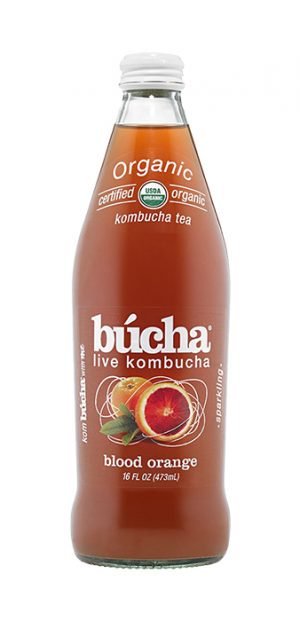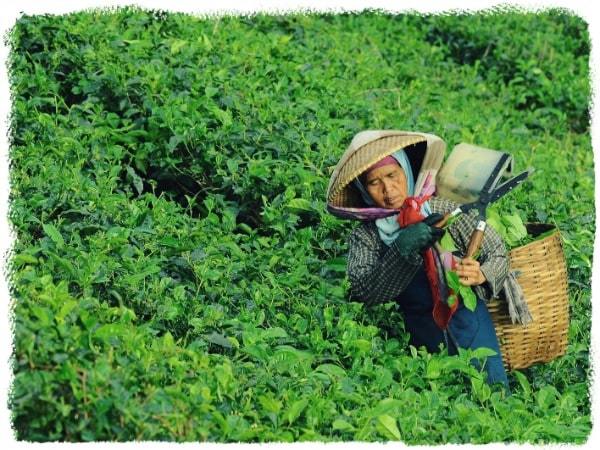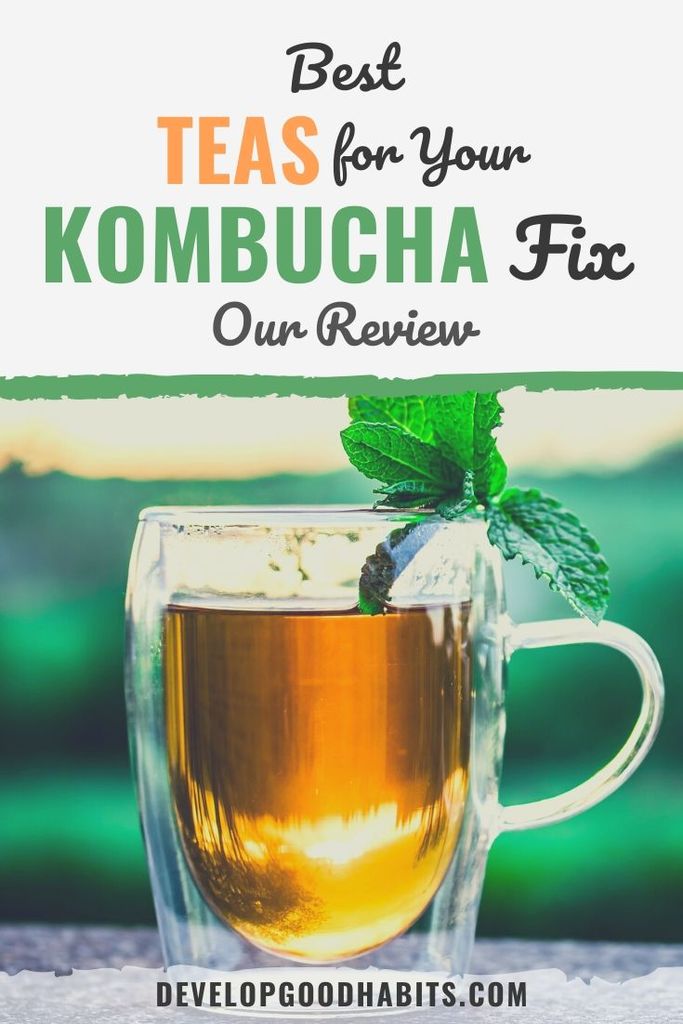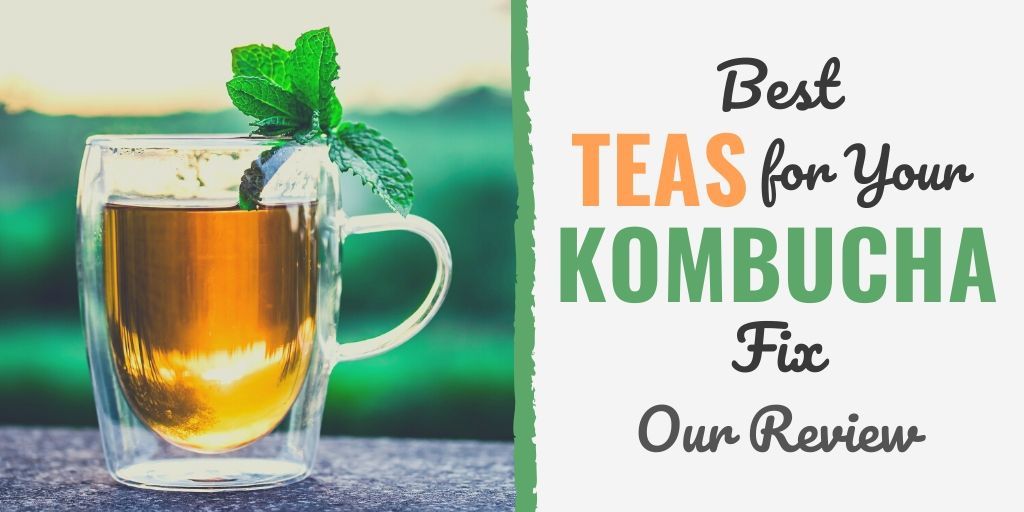You’ve probably heard of kombucha.
This beverage has steadily gained popularity in recent years, with classes on brewing kombucha offered in local communities, DIY brewing tutorials available on social media, and taprooms offering kombucha alongside their pilsen and stout.
Despite its recent popularity, however, kombucha has been brewed and consumed for thousands of years. It traces its origins back to around 220 B.C. in Manchuria (which is now northeast China). People consumed this fermented tea drink for its healing properties.
The key ingredient in making great quality kombucha is tea that comes from the Camellia sinensis plant. The nutrients found in tea, such as caffeine and theanine, act as food for the kombucha organism. There are many varieties of teas, and each one affects kombucha’s flavor in different ways.
In this article, we have reviewed the seven best teas for kombucha currently available on the market. But first, let’s quickly go over the process of brewing kombucha.
Don't have time to read the entire review?
If you're a busy person who doesn't have time to read this entire review, we've simplified everything. Here is a table to show you a quick rating of the best teas for kombucha.
 |
Best Kombucha Tea Drink: Bucha Live Kombucha | CLICK HERE FOR PRICE |
 |
Best Overall for Loose-Leaf Tea: Vahdam Assam Loose-Leaf Black Tea, 200+ cups | CLICK HERE FOR PRICE |
 |
Best Loose-Leaf Kombucha Option: Get Kombucha's Certified Organic Kombucha Tea Blend | CLICK HERE FOR PRICE |
 |
Best Value for the Money: Original Kombucha Tea Blend by The Kombucha Shop | CLICK HERE FOR PRICE |
 |
Most Budget-Friendly: Kombucha Loose Leaf Black and Green Tea 50/50 Blend by Solstice Tea Traders | CLICK HERE FOR PRICE |
 |
Best Green Tea with Kombucha: Yogi Tea - Green Tea Kombucha | CLICK HERE FOR PRICE |
 |
Best Canned Kombucha Tea Drink: Better Booch Kombucha Organic Canned Drink | CLICK HERE FOR PRICE |
What Is Kombucha?
Kombucha is made using four basic ingredients:
SCOBY stands for the “symbiotic colony of bacteria and yeast.” It is the most important component of kombucha. Without it, you’ll just have a bottle of regular, sweetened tea.
The SCOBY is bacterial culture of a grayish or beige mass you’ll see floating within the brew. This is largely responsible for kombucha’s carbonation, the minimal alcohol content, and, most especially, the tangy, vinegar-like flavor.
To make kombucha, you must first brew your tea. It is important to choose the right type of tea for making kombucha.
Sweeten it with either honey or sugar. Then, put in the SCOBY and allow it to ferment for about a week. Then you can bottle it and leave it at room temperature for several more days. After that, your fermented beverage is ready.
What Are the Benefits of Kombucha?
One of the most widely recognized benefits of drinking kombucha is its ability to aid in the digestion process. Kombucha contains high levels of probiotics, amino acids, and enzymes. Among other things, these factors reduce candida in the gut, which prevents it from overpopulating.
By adding live probiotic cultures, the gut is repopulated with good bacteria, which restores balance to the digestive system. Some research has even shown evidence that kombucha can prevent and heal stomach ulcers.
Research also claims that drinking kombucha can help fight against several infections and diseases because of its ability to detoxify, reduce oxidation, and promote strong immunity. These properties can also play a role in reducing your risk of developing cancer.
The high antioxidant content in kombucha helps reduce oxidative stress that is potentially damaging to cells. Constant exposure to processed foods, environmental chemicals, and toxins can lead to oxidation in your cells, which can then cause chronic inflammation.
While tea also contains antioxidants, studies have shown that the fermentation process of kombucha generates additional antioxidants that are not present in other teas, such as glucaric acid.
Preliminary studies have shown that consuming more foods that contain glucaric acid may reduce your cancer risk by slowing down an enzyme called beta-glucuronidase. Kombucha also contains quercetin, which is known to have massive anticancer properties.
Kombucha may help decrease the risk of heart disease as well. Animal studies have shown that consuming a daily dose of kombucha can result in higher HDL cholesterol, lower triglycerides, and an improved outcome if a heart attack does occur.
Researchers have found that kombucha provides a significant protective element against heart attacks. While drinking regular tea can provide some protection, kombucha is significantly more effective than tea when it comes to increasing heart health.
Kombucha may also help manage type 2 diabetes. Due to the antioxidants in it, kombucha seems to help alleviate symptoms of diabetes even more efficiently than its black tea base, which is already known to be an anti-diabetic.
Kombucha is particularly effective in promoting proper liver and kidney function, which are typically poor in people suffering from diabetes.
The ways that kombucha can help improve your health are as follows:
A large amount of healthy bacteria grows in kombucha, including several species of lactic-acid bacteria, which are known to have probiotic properties. The probiotic bacteria that is present in kombucha aids in promoting healthy digestion, helps reduce inflammation, and can even promote weight loss.
The acetic acid in kombucha is what gives it its vinegary taste. It is produced during kombucha’s fermentation process, and acts as a natural cleanser for your body. The health benefits of acetic acid are huge, including its ability to reduce inflammation, lower blood pressure, and control blood sugar.
Additionally, acetic acid has an alkaline effect, which encourages all of your body's processes to run smoothly. Acetic acid also has an antimicrobial effect, meaning it can help kill harmful bacteria before they are absorbed in your body.
As the main ingredient in kombucha, tea possesses heart-friendly properties. In studies, rats that drank kombucha had the highest HDL levels and lowest triglycerides, resulting in the healthiest hearts according to standard measures.
The rats that drank kombucha were also able to survive heart attacks at a greater rate than rats that did not drink kombucha, likely because their hearts were dramatically less swollen and lighter. Additionally, the rats that drank kombucha had fewer cardiac markers in their bloodstreams, which suggests that their hearts were not as badly damaged overall as the other rats.
Also, as a tea-based drink, kombucha has the potential to prevent or treat diabetes. Because kombucha is made from tea, it offers the same benefits as this well-known, healthy drink.
Tea contains many bioactive compounds, such as polyphenols, which are also present in kombucha. Polyphenols are powerful antioxidants that are good for the body and can help reduce belly fat, improve cholesterol, and control blood glucose levels, which all contribute to the prevention and treatment of diabetes.

Finally, kombucha slows or stops the growth of certain cancer cells, including prostate, breast, and colon cancers. Because kombucha contains powerful antioxidants that help detoxify the body, provide protection against disease, and reduce inflammation, it can help decrease the risk for these types of cancers as well.
Now that you know the health benefits of kombucha, let's look at some factors to consider when you are choosing the best tea to use for kombucha.
How Do I Choose the Best Tea for Kombucha?
Use only leaves from the Camellia sinensis plant.
Using true tea leaves allows your SCOBY to thrive and ensures that you’ll have great-tasting kombucha. The nutrients found in tea leaves Camellia sinensis, such as nitrogen, caffeine, and theanine, combine with sugar to ensure your kombucha colony grows. You will get the cleanest flavor and the densest amount of nutrition from these leaves.
Choose organic.
Tea leaves do not get washed before you brew them in hot water. This means that if your tea leaves are coated in chemicals and pesticides, these toxins will end up in your drink and eventually in your body.
These same chemicals can hinder the fermentation and brewing process of your kombucha, and can even kill your SCOBY. To avoid ingesting pesticides and other harmful chemicals, ensure that your tea leaves are organic.
If price is not an issue, choose loose-leaf tea.
Using loose-leaf tea allows you to have more flexibility in the amount of tea you can brew. Plus, the quality of tea is higher, and the flavor is usually better. This will even allow you to blend different tea leaves together to create your own unique flavor profiles.
Additionally, using tea bags may also contaminate your kombucha with toxins. Chemicals are used to keep tea bags from becoming mush in hot water, and the newer nylon-like tea bags contain plastic. It is better for the environment and for your overall health to stick with loose-leaf tea.
Go for black tea for a more traditional brew.
Of all the varieties of teas out there, black tea is the most commonly used for brewing kombucha, and it is definitely best to start with this if you are a beginner. In China, black tea is referred to as “red tea.” This type of tea has a long history with kombucha, as kombucha in Chinese literally translates to “red tea bacteria.”
When it comes to green vs. black tea kombucha, SCOBY typically takes longer to grow if you use green tea. Also, the flavor of kombucha that is made from green tea is a bit more distinct, and may not be something that you prefer.

Ethical standards of manufacturing.
Choose fair trade teas to help farmers and laborers earn a living wage. The more often you make conscious decisions like this, the more impact you will have in contributing to an ethical global society.
Now you know what you are looking for, so let's look at the factors you are not looking for.
What Should I Avoid When Choosing the Right Tea for Kombucha?
Herbal Teas
You don't want to use herbal teas, such as chamomile or lavender, as the base of your brew. The SCOBY can’t thrive in herbal beverages because herbs contain essential oils that kill the probiotics in SCOBY and interfere with its ability to absorb oxygen. Herbal teas also can't provide you with the nutrients that are needed to feed your kombucha culture.
Flavored Teas
Teas that are flavored, such as red zinger, can damage the SCOBY culture. They do not contain enough nutrients to keep the SCOBY alive or growing, meaning you can ruin your SCOBY if you attempt to use these teas. If you have been watching your SCOBY grow for several weeks, it can be painful to watch it quickly become ruined.
Strongly Flavored Teas
In addition to the reasons stated above, you want to avoid using strongly flavored teas like Lapsang Souchong or smoke-flavored teas, as the strong flavors usually do not blend well with the taste of kombucha. This is another example of a time where you don't want to waste your SCOBY on a batch of kombucha that doesn't work out well.
Decaffeinated Teas
SCOBY needs caffeine in order to thrive. It uses it as a main nutrient, and caffeine is essential for its success.
Note: Although flavored teas are not recommended for use during the initial brewing of kombucha, they can be added after the SCOBY has been taken out (when the first fermentation is finished) as part of your experimentation with kombucha flavors.
Aim to have at least four batches of SCOBY before starting to experiment with kombucha flavors. If you know how to make kombucha and you consider yourself to be a pro in this project, go ahead and mix any flavors that you wish!
Now let's look at some of the best options on the market today.
The Seven Best Teas for Kombucha
1. Best Kombucha Tea Drink: Bucha Live Kombucha
Bucha Live Kombucha
New Age Beverages brews USDA certified organic live kombucha into delicious beverages in their Bucha beverage line. These drinks have all the benefits of kombucha, boosting your immunity and digestive health, along with organic fruit juices, flavorings, and teas for a drink that is as delicious as it is good for you.
Bucha teas are triple-distilled to produce a drink that is free of sediment and smooth-tasting. Each batch is strictly controlled for consistency and quality, reducing any secondary fermentation. Bucha drinks are light, sweet, and bubbly, without the acidic, vinegary aftertaste of many kombucha products.
Bucha Live Kombucha comes in delicious flavors like blood orange, grapefruit sage, guava mango, and raspberry pomegranate. Each glass bottle contains 16 ounces and 50 calories.
PROS
CONS
2. Best Overall for Loose-Leaf Tea: Vahdam Assam Loose-Leaf Black Tea, 200+ cups

This is the best overall choice, as it is organically sourced from the regions of Assam, India. If you’re concerned about ethical standards, this brand is fair trade and comes with a 100% money-back guarantee. Additionally, 1% of their sales go directly toward the education of their tea workers' children.
This is a premium, full-bodied black tea that is harvested during the peak second flush summer season. It is dark red in color and is very aromatic, with hints of dark chocolate and malt.
This is a loose-leaf tea that comes in a resealable bag. The tea leaves are procured directly from plantations within 72 hours of production, and packaged fresh before being shipped directly from the source in India.
PROS
CONS
3. Best Loose-Leaf Kombucha Option: Get Kombucha's Certified Organic Kombucha Tea Blend
Making kombucha yourself isn't very difficult, but it's important to start with the highest quality kombucha. The Get Kombucha loose leaf blend is certified organic, and specifically blended for home kombucha brewing. The loose leaf teas are carefully blended to a precise ratio perfect for making your own kombucha tea.
Get Kombucha's Certified Organic Kombucha Tea Blend is certified organic by Quality Assurance International. The specific ratio of green and black tea is blended to create the right balance of yeast and bacteria so you can brew kombucha and have the best taste, health, and results every time.
Note that this tea blend is not a complete kombucha starter kit, and does not include a scoby, so if it's your first time brewing kombucha, you will also need one. This organic scoby from Scoby Kombucha is a good choice.
PROS
CONS
4. Best Value for the Money: Original Kombucha Tea Blend by The Kombucha Shop
The Kombucha Shop Original Kombucha tea blend is made from the highest quality organic, fairly traded teas. The perfectly balanced blend is designed for a clean, traditional flavor with a healthy ratio of yeast and bacteria for home brewing, offered at a great price for organic and fair trade tea of this quality.
The Original Kombucha Tea Blend by The Kombucha Shop is a traditional kombucha tea blend, made with teas of the highest quality. The organic, fairly traded, Single Estate Ceylon black tea gives a light, citrus note, along with the earthier notes of Wuyi Oolong tea. It's a fantastic base for brewing medium-bodied traditional kombucha tea.
PROS
CONS
5. Most Budget-Friendly: Kombucha Loose Leaf Black and Green Tea 50/50 Blend by Solstice Tea Traders
Solstice Tea Traders specifically hand blend this tea to provide a perfectly balanced ratio of tea for home kombucha brewing. This blend contains high quality teas imported by one of America's oldest tea importers, and creates a delicious kombucha at an affordable price.
The Kombucha Loose Leaf Black and Green Tea 50/50 Blend by Solstice Tea Traders is blended by hand and packaged in the US. It's a 50/50 blend of excellent quality Keenum congou china black tea and Chinese young hyson green tea, with a great balance of yeast and bacteria for brewing.
PROS
CONS
6. Best Green Tea with Kombucha: Yogi Tea – Green Tea Kombucha
If you don't have the patience to brew your own kombucha, these tea bags from Yogi Tea have kombucha and green tea for a healthy, anti-oxidant tea. Flavors of lemongrass and spearmint lend a delicate and refreshing note to this tea, making you feel energized. Yogi Teas are made the US, certified organic by QAI, and dedicated to social responsibility.
The Yogi Tea – Green Tea Kombucha blend combines organic green tea, organic kombucha, organic lemongrass, and organic spearmint, along with the light flavors of organic passionfruit and plum for a tea that is delicious and full of antioxidants to support your health. These teas are organic, vegan, and certified non-GMO. Yogi Teas is a B-corp dedicated to sustainability, so the tea bags are compostable, and the package is made of recycled materials. It's a tea that is good for you inside and out.
PROS
CONS
7. Best Canned Kombucha Tea Drink: Better Booch Kombucha Organic Canned Drink
Better Booch really cares about their kombucha, brewing single batches with care, using only natural, organic ingredients. To preserve the probiotics and live cultures, Better Booch canned kombucha teas are shipped cold, so you get the maximum health benefits as well as a delicious, naturally sweetened flavor. It's simply the best kombucha tea drink.
Better Booch Kombucha Organic Canned Drink is made in single batches, from organic ingredients and all-natural flavors. Cold shipping preserves the probiotics, cultures, and adaptogens of kombucha, ensuring that you get the most powerful health benefits from every can. This sparkling kombucha tea is vegan, kosher, gluten-free, and a raw food. The ingredients are certified organic and verified non-GMO. Metal cans are BPA-free and infinitely reusable and recyclable, and Better Booch supports the Natural Therapies program at City of Hope.
Better Booch comes in amazing flavors like golden pear, citrus sunrise, ginger boost, morning glory (flavored with organic peach and black tea), rose bliss, horchata, and cherry retreat. You can also order a variety pack to experience the most popular flavors and choose your favorite.
PROS
CONS
Final Thoughts on Best Teas for Your Kombucha Fix
All the teas featured today are ideal for brewing kombucha. However, if you are a stickler for traditions, then Bucha Live Kombucha is your best option, for the quality ingredients and ethical standards of manufacture, clearly making this the top tea brand for your next kombucha brew.







